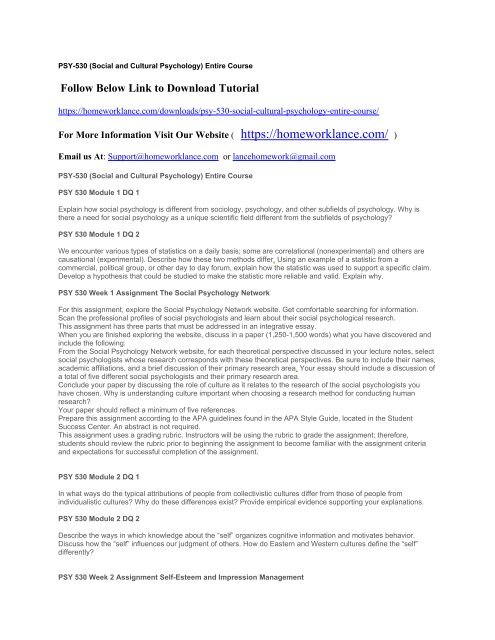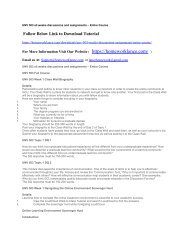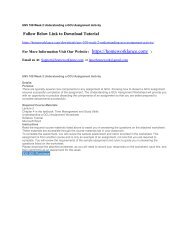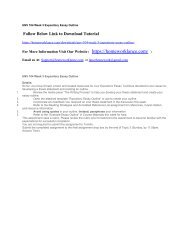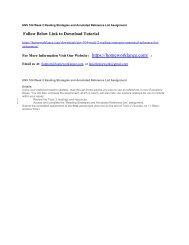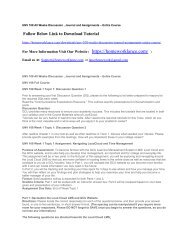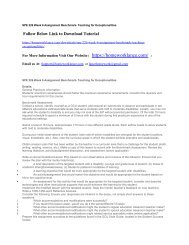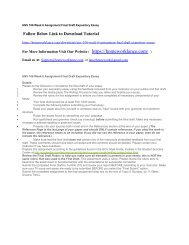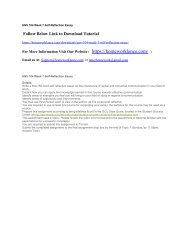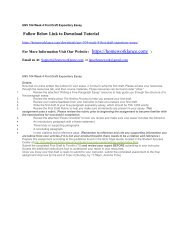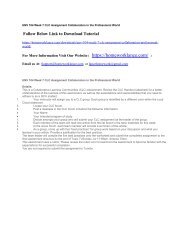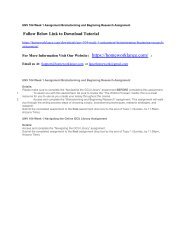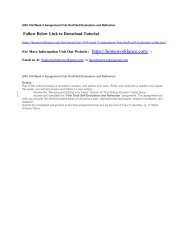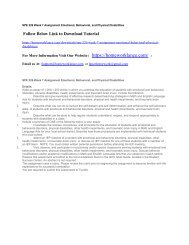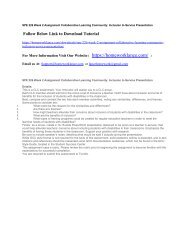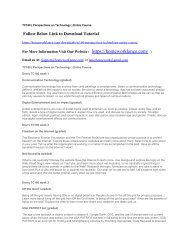PSY-530 (Social and Cultural Psychology) Entire Course
Create successful ePaper yourself
Turn your PDF publications into a flip-book with our unique Google optimized e-Paper software.
<strong>PSY</strong>-<strong>530</strong> (<strong>Social</strong> <strong>and</strong> <strong>Cultural</strong> <strong>Psychology</strong>) <strong>Entire</strong> <strong>Course</strong><br />
Follow Below Link to Download Tutorial<br />
https://homeworklance.com/downloads/psy-<strong>530</strong>-social-cultural-psychology-entire-course/<br />
For More Information Visit Our Website ( https://homeworklance.com/ )<br />
Email us At: Support@homeworklance.com or lancehomework@gmail.com<br />
<strong>PSY</strong>-<strong>530</strong> (<strong>Social</strong> <strong>and</strong> <strong>Cultural</strong> <strong>Psychology</strong>) <strong>Entire</strong> <strong>Course</strong><br />
<strong>PSY</strong> <strong>530</strong> Module 1 DQ 1<br />
Explain how social psychology is different from sociology, psychology, <strong>and</strong> other subfields of psychology. Why is<br />
there a need for social psychology as a unique scientific field different from the subfields of psychology?<br />
<strong>PSY</strong> <strong>530</strong> Module 1 DQ 2<br />
We encounter various types of statistics on a daily basis; some are correlational (nonexperimental) <strong>and</strong> others are<br />
causational (experimental). Describe how these two methods differ. Using an example of a statistic from a<br />
commercial, political group, or other day to day forum, explain how the statistic was used to support a specific claim.<br />
Develop a hypothesis that could be studied to make the statistic more reliable <strong>and</strong> valid. Explain why.<br />
<strong>PSY</strong> <strong>530</strong> Week 1 Assignment The <strong>Social</strong> <strong>Psychology</strong> Network<br />
For this assignment, explore the <strong>Social</strong> <strong>Psychology</strong> Network website. Get comfortable searching for information.<br />
Scan the professional profiles of social psychologists <strong>and</strong> learn about their social psychological research.<br />
This assignment has three parts that must be addressed in an integrative essay.<br />
When you are finished exploring the website, discuss in a paper (1,250-1,500 words) what you have discovered <strong>and</strong><br />
include the following:<br />
From the <strong>Social</strong> <strong>Psychology</strong> Network website, for each theoretical perspective discussed in your lecture notes, select<br />
social psychologists whose research corresponds with these theoretical perspectives. Be sure to include their names,<br />
academic affiliations, <strong>and</strong> a brief discussion of their primary research area. Your essay should include a discussion of<br />
a total of five different social psychologists <strong>and</strong> their primary research area.<br />
Conclude your paper by discussing the role of culture as it relates to the research of the social psychologists you<br />
have chosen. Why is underst<strong>and</strong>ing culture important when choosing a research method for conducting human<br />
research?<br />
Your paper should reflect a minimum of five references.<br />
Prepare this assignment according to the APA guidelines found in the APA Style Guide, located in the Student<br />
Success Center. An abstract is not required.<br />
This assignment uses a grading rubric. Instructors will be using the rubric to grade the assignment; therefore,<br />
students should review the rubric prior to beginning the assignment to become familiar with the assignment criteria<br />
<strong>and</strong> expectations for successful completion of the assignment.<br />
<strong>PSY</strong> <strong>530</strong> Module 2 DQ 1<br />
In what ways do the typical attributions of people from collectivistic cultures differ from those of people from<br />
individualistic cultures? Why do these differences exist? Provide empirical evidence supporting your explanations.<br />
<strong>PSY</strong> <strong>530</strong> Module 2 DQ 2<br />
Describe the ways in which knowledge about the “self” organizes cognitive information <strong>and</strong> motivates behavior.<br />
Discuss how the “self” influences our judgment of others. How do Eastern <strong>and</strong> Western cultures define the “self”<br />
differently?<br />
<strong>PSY</strong> <strong>530</strong> Week 2 Assignment Self-Esteem <strong>and</strong> Impression Management
Details:<br />
Provide a minimum of four personal examples to illustrate impression management, social tuning, social<br />
comparisons, mindsets, intrinsic/extrinsic motivation, or causal theories.<br />
One example provided must address face to face versus written communication styles. Are there measures that can<br />
be taken when communicating non-verbally to improve self-presentation, impression management, attributional<br />
inferences, <strong>and</strong> cognitive biases?<br />
Each example provided should be based upon how your personal views were shaped by parents, teachers, friends,<br />
community, culture, etc. Each example should be supported by relevant research.<br />
Prepare this assignment according to the APA guidelines found in the APA Style Guide, located in the Student<br />
Success Center. An abstract is not required.<br />
This assignment uses a grading rubric. Instructors will be using the rubric to grade the assignment; therefore,<br />
students should review the rubric prior to beginning the assignment to become familiar with the assignment criteria<br />
<strong>and</strong> expectations for successful completion of the assignment.<br />
<strong>PSY</strong> <strong>530</strong> Module 3 DQ 1<br />
Prejudice has traditionally been assumed to be the product of some form of malice, brought about by social or<br />
emotional forces. In recent years, there has been increasing research on how prejudice can result from cognitive<br />
processes, without malicious intent. Discuss how <strong>and</strong> why cognitive processes can produce prejudice. What is the<br />
impact of culture on prejudice? Once stereotypes <strong>and</strong> prejudices are formed, how do they come to be selfperpetuating?<br />
<strong>PSY</strong> <strong>530</strong> Module 3 DQ 2<br />
Discuss <strong>and</strong> provide research evidence for five reasons why attitudes sometimes fail to predict behavior.<br />
<strong>PSY</strong> <strong>530</strong> Week 3 Assignment Institutionalized Bias<br />
Details:<br />
In a 750-1,000-word essay, discuss the impacts of institutional bias.<br />
What are some examples of institutional biases?<br />
What roles do attitudes, stereotypes, <strong>and</strong> prejudices play in institutional biases?<br />
What impact does cultural influence have on institutional biases?<br />
You may consider how institutional biases are apparent in health care, education, <strong>and</strong> the workplace or based upon a<br />
person’s age.<br />
Support your paper with three scholarly sources from the GCU library.<br />
Prepare this assignment according to the APA guidelines found in the APA Style Guide, located in the Student<br />
Success Center. An abstract is not required.<br />
This assignment uses a grading rubric. Instructors will be using the rubric to grade the assignment; therefore,<br />
students should review the rubric prior to beginning the assignment to become familiar with the assignment criteria<br />
<strong>and</strong> expectations for successful completion of the assignment.<br />
<strong>PSY</strong> <strong>530</strong> Module 4 DQ 1<br />
Provide a real-life example of informational social influences impacting a person’s decision or behavior. Provide a<br />
real-life example of normative social influences impacting a person’s decision or behavior. Can the influence of<br />
conformity, compliance, or obedience be decreased? How would this impact the situations you identified?<br />
<strong>PSY</strong> <strong>530</strong> Module 4 DQ 2<br />
Max Points: 5.0<br />
In what ways can social influence have a positive impact on behavior? Provide examples to support your response.<br />
<strong>PSY</strong> <strong>530</strong> Week 4 Assignment Friendships <strong>and</strong> Intimate Relationships<br />
Details:<br />
In a 750-1,000-word essay, describe how the five factors of personal attraction affect friendships <strong>and</strong> intimate<br />
relationships. Address the following:
1. How do different perspectives impact relationship development <strong>and</strong> maintenance particularly in terms of<br />
exchange versus communal factors?<br />
2. How do attachment styles impact the level of intimacy shared in friendships <strong>and</strong> relationships?<br />
3. Using the social exchange theory, equity theory <strong>and</strong> penetration theory, describe how relationships are<br />
maintained or ended.<br />
Prepare this assignment according to the APA guidelines found in the APA Style Guide, located in the Student<br />
Success Center. An abstract is not required.<br />
This assignment uses a grading rubric. Instructors will be using the rubric to grade the assignment; therefore,<br />
students should review the rubric prior to beginning the assignment to become familiar with the assignment criteria<br />
<strong>and</strong> expectations for successful completion of the assignment.<br />
<strong>PSY</strong> <strong>530</strong> Module 5 DQ 1<br />
Max Points: 5.0<br />
Consider how being part of a crowd or group changes your behavior. How can deindividuation change people’s<br />
behavior? Could deindividuation lead to positive outcomes? What is a way to encourage members of a crowd to<br />
behave in line with their “normal” values?<br />
<strong>PSY</strong> <strong>530</strong> Module 5 DQ 2<br />
Select one scholarly article on aggression. Explain situational forces, sociocultural pressures, <strong>and</strong> individual<br />
differences that promote aggressive behavior. In addition, discuss theories of aggression as they apply to the article<br />
selected.<br />
<strong>PSY</strong> <strong>530</strong> Week 5 Assignment 1 Prosocial Behavior<br />
Details:<br />
Review the Byst<strong>and</strong>er Effect at:<br />
https://explorable.com/byst<strong>and</strong>er-apathy-experiment<br />
or<br />
https://www.psychologytoday.com/basics/byst<strong>and</strong>er-effect<br />
In an essay of 750-1,000 words, define <strong>and</strong> discuss the ways in which diffusion of responsibility, pluralistic ignorance,<br />
<strong>and</strong> victim effects can influence helping behavior.<br />
In what ways might social <strong>and</strong> cultural pressure, <strong>and</strong> beliefs about “self” affect helping behavior?<br />
Locate three scholarly sources to assist in writing this paper.<br />
Prepare this assignment according to the APA guidelines found in the APA Style Guide, located in the Student<br />
Success Center.<br />
This assignment uses a grading rubric. Instructors will be using the rubric to grade the assignment; therefore,<br />
students should review the rubric prior to beginning the assignment to become familiar with the assignment criteria<br />
<strong>and</strong> expectations for successful completion of the assignment.<br />
<strong>PSY</strong> <strong>530</strong> Week 5 Assignment 2 Research Paper: Rough Draft<br />
Refer to “<strong>PSY</strong>-<strong>530</strong> Research Paper Protocols” <strong>and</strong> follow the instructions for completing the rough draft.<br />
<strong>PSY</strong> <strong>530</strong> Module 6 DQ 1<br />
Groupthink <strong>and</strong> group polarization are influences that often cause groups to reach different solutions to a problem<br />
than individuals. Explain each concept <strong>and</strong> discuss the conditions that are thought to lead to each. How might the<br />
presence of others <strong>and</strong> institutional groupthink impact helping those who are less fortunate?<br />
<strong>PSY</strong> <strong>530</strong> Module 6 DQ 2<br />
Max Points: 5.0<br />
Are you better off being an optimist (perhaps a Pollyanna) or is it better to be a realist (grounded in reality) as far as<br />
your health <strong>and</strong> well-being are concerned? Why?<br />
<strong>PSY</strong> <strong>530</strong> Week 6 Assignment Groupthink<br />
Details:
In an essay of 750-1,000 words, discuss the reliability of eyewitness testimony.<br />
Include a relevant court case in which eyewitness testimony was used to convict or acquit an individual.<br />
Discuss how the reasonable person st<strong>and</strong>ard applies to eyewitness testimony.<br />
Locate three relevant scholarly articles to support the information in your paper.<br />
Prepare this assignment according to the APA guidelines found in the APA Style Guide, located in the Student<br />
Success Center. An abstract is not required.<br />
This assignment uses a grading rubric. Instructors will be using the rubric to grade the assignment; therefore,<br />
students should review the rubric prior to beginning the assignment to become familiar with the assignment criteria<br />
<strong>and</strong> expectations for successful completion of the assignment.<br />
<strong>PSY</strong> <strong>530</strong> Module 7 DQ 1<br />
Explain how religion influences social relationships, moral attitudes, <strong>and</strong> moral behaviors, including cheating,<br />
substance abuse, sexuality, criminality, <strong>and</strong> domestic violence.<br />
<strong>PSY</strong> <strong>530</strong> Module 7 DQ 2<br />
Max Points: 5.0<br />
Select a scholarly article that discusses religion <strong>and</strong> happiness. Discuss the effect that religious belief has on<br />
people’s happiness or unhappiness as it relates to their behaviors <strong>and</strong> attitudes. What effect does religion have on<br />
helping behavior, the prevalence of prejudice, <strong>and</strong> health of religious people? Share your findings.<br />
<strong>PSY</strong> <strong>530</strong> Week 7 Research Paper: Final Draft<br />
Details:<br />
Refer to “<strong>PSY</strong>-<strong>530</strong> Research Paper Protocols” <strong>and</strong> follow the instructions for completing the final draft.<br />
<strong>PSY</strong> <strong>530</strong> Module 8 DQ 1<br />
Using Hofstede’s theory, compare <strong>and</strong> contrast two countries on these four types of cultural values.<br />
<strong>PSY</strong> <strong>530</strong> Module 8 DQ 2<br />
Max Points: 5.0<br />
The Module 8 lecture discussed both pessimistic <strong>and</strong> optimistic perspectives on global unity. Where do you weigh in<br />
on this issue <strong>and</strong> why?<br />
<strong>PSY</strong> <strong>530</strong> Week 8 Final Exam<br />
Details:<br />
Complete the final exam. Your instructor will post the final exam at the beginning of Module 8 in the <strong>Course</strong> Add-Ons<br />
section.<br />
You have until the end of Module 8 to complete the exam. Late exams are not accepted.<br />
The final exam consists of the following:<br />
Choose four of the sixteen essay question choices. Write a complete, integrative essay response, supporting your<br />
answers with examples from the lectures <strong>and</strong> textbook.<br />
Website sources are not acceptable as supporting references for the exam. Be sure to number your answers to<br />
correspond with your question selections, <strong>and</strong> provide applicable references at the end of each question.<br />
While APA format is not required for the body of this assignment, solid academic writing is expected, <strong>and</strong> in-text<br />
citations <strong>and</strong> references should be presented using APA documentation guidelines, which can be found in the APA<br />
Style Guide, located in the Student Success Center.


